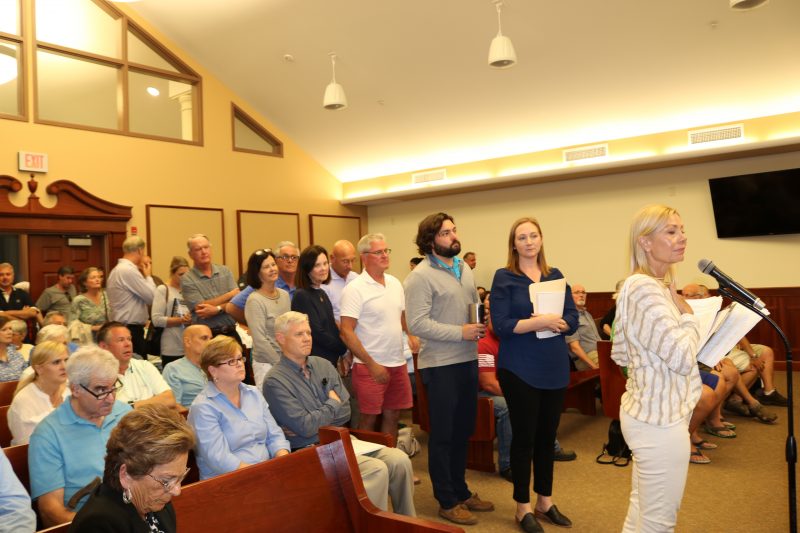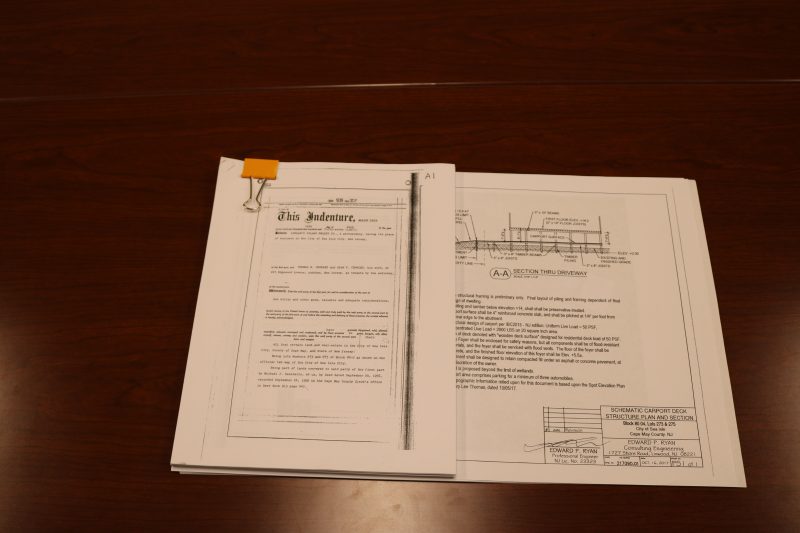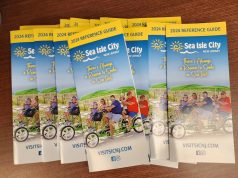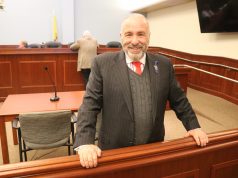
By DONALD WITTKOWSKI
Sea Isle City and two property owners who were denied zoning approval to build a single-family home on a site that partially falls within a wetlands conservation zone may have found a way to resolve their legal battle.
Both sides have filed an application with the Cape May County Open Space Review Board to have the county buy the land from the property owners for around $600,000. Sea Isle, in turn, would use the bayfront site at 81st Street to build a public kayak launch site serving the south end of town, City Solicitor Paul Baldini said.
“I think it would be great for Sea Isle,” he said in an interview Friday.
Baldini noted that the open space review board still must vote on the proposal. No date has been set. Baldini believes the board will look favorably upon plans for a kayak launch site because it “fits with the theme” of using land that is located in a wetlands conservation zone for recreation.
Under Sea Isle’s zoning laws, areas that are designated for wetlands conservation are restricted to “recreational fishing and crabbing, boating, passive recreation and environmental study.” Home construction is not allowed in those areas.
The property owners, Shirley A. Kling and Terrance L. Crowley, had sought a variance from the zoning board that would have allowed them to build a vacation home on the land.
In a 5-1 vote at a meeting in June 2019, Sea Isle’s zoning board refused Kling and Crowley’s request for a variance after expressing concerns about flooding in the neighborhood. The zoning members also said they did not want to set a precedent by allowing a new home to be built in a wetlands conservation area.
Kling and Crowley responded by filing a lawsuit in 2019 that alleged the board was “arbitrary, capricious and unreasonable” in its decision to reject the zoning variance. They asked a Superior Court judge to overturn the board’s ruling, but their appeal was denied.

The Kling and Crowley property, owned by the families since 1957, is tucked behind tall marsh reeds at the bay end of 81st Street in Sea Isle’s Townsends Inlet section. Kling and Crowley own two adjacent bayfront lots. When they sought the zoning board’s approval, they said they wanted to build on one lot and keep the second lot vacant.
The suit claimed that Kling and Crowley’s proposed project “satisfied all criteria” for a variance and would not have a negative impact on wetlands, flooding, threatened or endangered wildlife or other environmental concerns.
The lot that they proposed to develop for their vacation home is unusual because half of it is zoned for housing construction, while the other half lies within in the wetlands conservation area.
During the 2019 zoning board meeting, which included a packed audience at City Hall, opponents lined up to testify against the proposed project. The line stretched out the door and into the hallway. Opponents expressed fear that the project would have harmed the environment and exacerbated flooding in the surrounding neighborhood.
Prior to coming before the zoning board, Kling and Crowley had obtained approvals from the New Jersey Department of Environmental Protection and the U.S. Army Corps of Engineers to build a single-family home on the same site, according to their suit.
The DEP had previously denied granting a permit for residential construction on the land, but reconsidered after the families appealed.

In addition to naming the zoning board in their suit, Kling and Crowley also sued the city of Sea Isle. That part of the litigation remains alive as both sides debate whether the city should have to compensate Kling and Crowley for their property, Baldini said.
The suit focuses on an issue known as “inverse condemnation.” It is a legal term to describe when government takes private property but fails to pay the required “just compensation” for the land.
Kling and Crowley allege that the city has effectively condemned their land by not allowing them to build on it and should pay them for the property.
Baldini said the city is disputing those allegations. He maintained the city has not rendered the land useless because Kling and Crowley are still allowed to use the property for recreational purposes such as fishing, crabbing and boating within the wetlands conservation zone.
Robert Baranowski, a Marlton, N.J., attorney representing Kling and Crowley, could not be reached for comment Friday.
Meanwhile, the court has delayed ruling on the “inverse condemnation” issue while both sides try to work out an agreement.
Settlement talks led to the decision for both sides to apply to the Cape May County Open Space Review Board to have the board buy the land from Kling and Crowley and preserve the site for recreation, Baldini said.

The city is discussing the possibility of building a small kayak launch site on the property, including a ramp that would give access to the bay waters in the south end of town.
Crowded with upscale homes, Sea Isle’s bayfront offers few places where kayakers, paddle boarders and anglers have public access to the water.
Sea Isle is already building a public kayak launch site and fishing pier on the bayfront near 60th Street, next to the city’s Dealy Field recreation and athletic complex. The nearly $1 million project is expected to be completed in March.
Baldini said a kayak launch site at 81st Street would not be nearly as elaborate or large as the one on 60th Street, but noted that the city believes both projects would complement each other.
At this time, there is no public kayak launch site in the city’s south end, Baldini said. A new one at 81st Street would give kayakers more options for paddling along the back bays, he pointed out.







